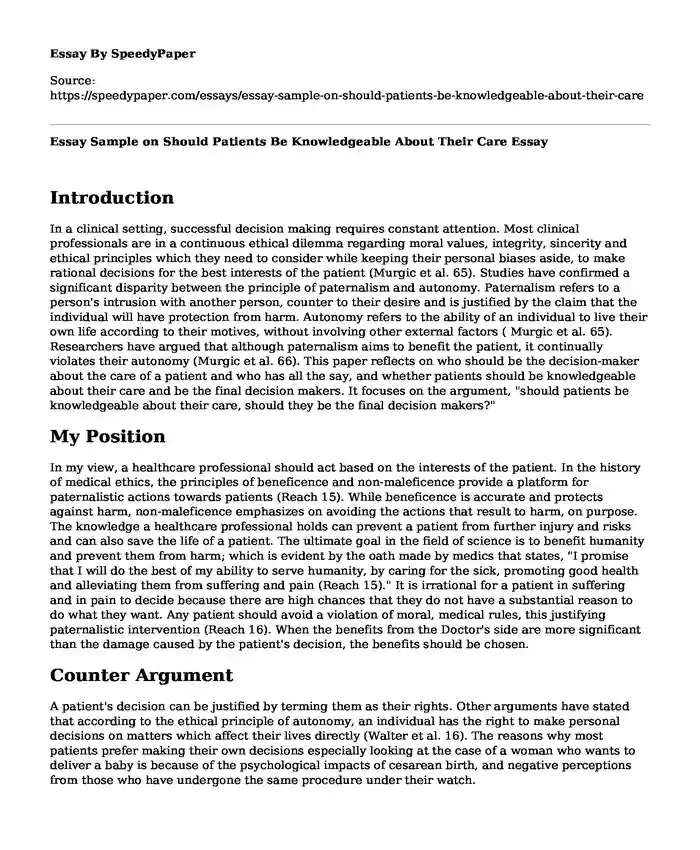
| Type of paper: | Essay |
| Categories: | Health and Social Care Human rights |
| Pages: | 3 |
| Wordcount: | 705 words |
Introduction
In a clinical setting, successful decision making requires constant attention. Most clinical professionals are in a continuous ethical dilemma regarding moral values, integrity, sincerity and ethical principles which they need to consider while keeping their personal biases aside, to make rational decisions for the best interests of the patient (Murgic et al. 65). Studies have confirmed a significant disparity between the principle of paternalism and autonomy. Paternalism refers to a person's intrusion with another person, counter to their desire and is justified by the claim that the individual will have protection from harm. Autonomy refers to the ability of an individual to live their own life according to their motives, without involving other external factors ( Murgic et al. 65). Researchers have argued that although paternalism aims to benefit the patient, it continually violates their autonomy (Murgic et al. 66). This paper reflects on who should be the decision-maker about the care of a patient and who has all the say, and whether patients should be knowledgeable about their care and be the final decision makers. It focuses on the argument, "should patients be knowledgeable about their care, should they be the final decision makers?"
My Position
In my view, a healthcare professional should act based on the interests of the patient. In the history of medical ethics, the principles of beneficence and non-maleficence provide a platform for paternalistic actions towards patients (Reach 15). While beneficence is accurate and protects against harm, non-maleficence emphasizes on avoiding the actions that result to harm, on purpose. The knowledge a healthcare professional holds can prevent a patient from further injury and risks and can also save the life of a patient. The ultimate goal in the field of science is to benefit humanity and prevent them from harm; which is evident by the oath made by medics that states, "I promise that I will do the best of my ability to serve humanity, by caring for the sick, promoting good health and alleviating them from suffering and pain (Reach 15)." It is irrational for a patient in suffering and in pain to decide because there are high chances that they do not have a substantial reason to do what they want. Any patient should avoid a violation of moral, medical rules, this justifying paternalistic intervention (Reach 16). When the benefits from the Doctor's side are more significant than the damage caused by the patient's decision, the benefits should be chosen.
Counter Argument
A patient's decision can be justified by terming them as their rights. Other arguments have stated that according to the ethical principle of autonomy, an individual has the right to make personal decisions on matters which affect their lives directly (Walter et al. 16). The reasons why most patients prefer making their own decisions especially looking at the case of a woman who wants to deliver a baby is because of the psychological impacts of cesarean birth, and negative perceptions from those who have undergone the same procedure under their watch.
Conclusion and Recommendations
Health care professionals, the nursing team and medics should put more emphasis on the ethical issues that surround their roles and should be adequately trained on the counseling skills and communication necessary when dealing with and handling a patient, when it comes to convincing them that the decision of the medical team is for saving their lives and preventing harm. Regardless of outcome and intention, paternalism has frequently been viewed in the negative light; this has necessitated the need for the creation of awareness sessions on the benefits of its implementation whenever it is appropriate. Health care professionals need always to remember the oath they took regarding the benefits of their services to humanity. All aspects of ethics have their importance when it comes to different scenarios, but for the benefit of humankind, answers have not been definite. The safer method, however, is the one that is for the benefit of the patient.
Works Cited
Murgic, Lucija, et al. "Paternalism and autonomy: views of patients and providers in a transitional (post-communist) country." BMC medical ethics 16.1 (2015): 65.
Reach, Gerard. "Patient autonomy in chronic care: solving a paradox." Patient preference and adherence 8 (2014): 15.
Walter, Jennifer K., and Lainie Friedman Ross. "Relational autonomy: moving beyond the limits of isolated individualism." Paediatrics 133.Suppl 1 (2014): S16-23.
Cite this page
Essay Sample on Should Patients Be Knowledgeable About Their Care. (2023, Jan 13). Retrieved from https://speedypaper.net/essays/essay-sample-on-should-patients-be-knowledgeable-about-their-care
Request Removal
If you are the original author of this essay and no longer wish to have it published on the SpeedyPaper website, please click below to request its removal:
- Essay Sample about the Difference Between the Islamic Conventional Banking Systems
- Essay Example: Comprehensive Care Plan
- Personal Essay Sample: Boston Marathon Reflection on Patriotism
- Essay Sample about Titus Flavius Josephus "Joseph Ben Matthias" and His Works
- Essay Sample: Racism, Slavery, Bourgeois and Proletarians in Frederick Douglass's Life
- Essay Sample on Social Media and Business Enlargement
- Free Essay - Final Care Coordination Plan
Popular categories




